Module 3 Unit 8 The food we eat 现在完成时课件(共28张PPT)
文档属性
| 名称 | Module 3 Unit 8 The food we eat 现在完成时课件(共28张PPT) |

|
|
| 格式 | zip | ||
| 文件大小 | 1.4MB | ||
| 资源类型 | 教案 | ||
| 版本资源 | 牛津上海版(试用本) | ||
| 科目 | 英语 | ||
| 更新时间 | 2018-11-22 00:00:00 | ||
图片预览

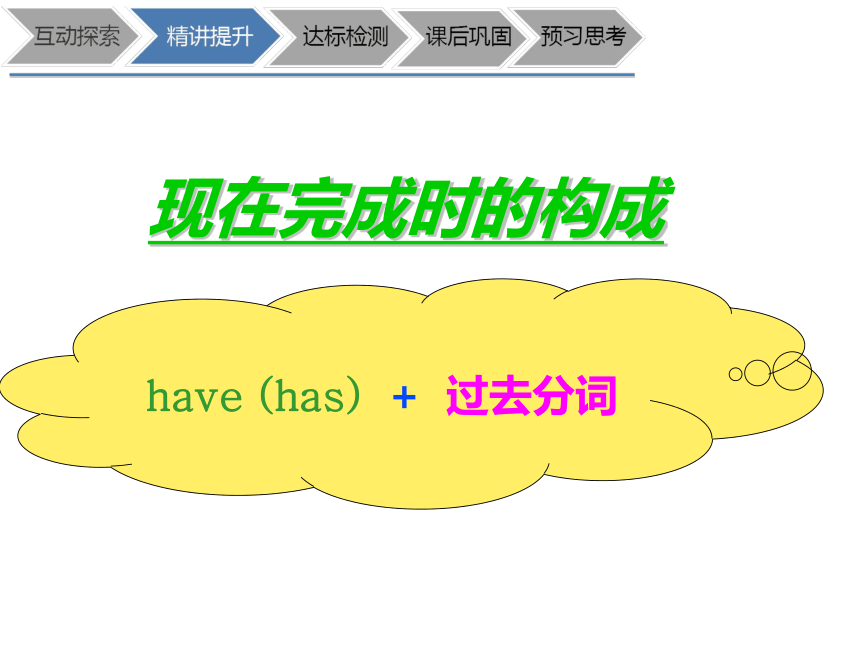
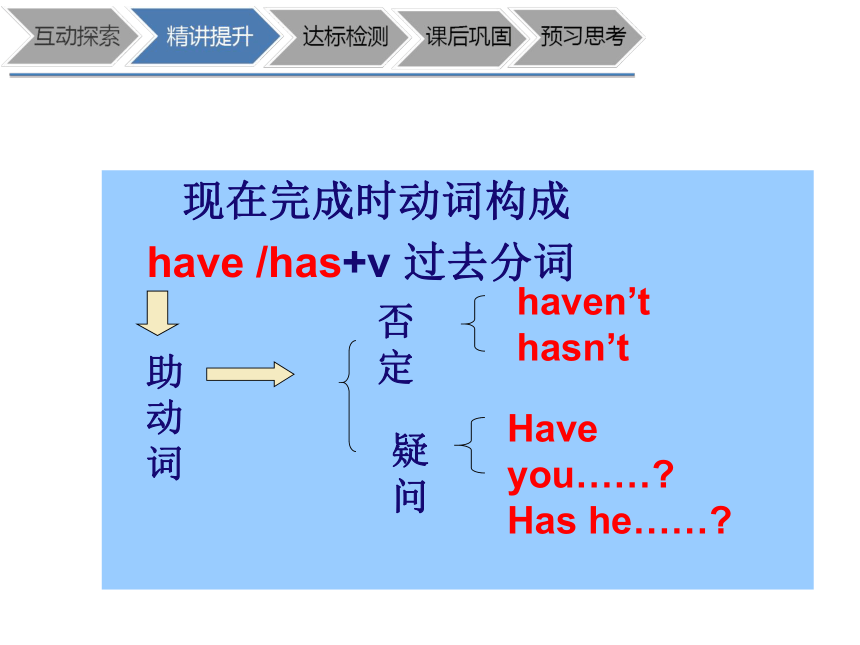

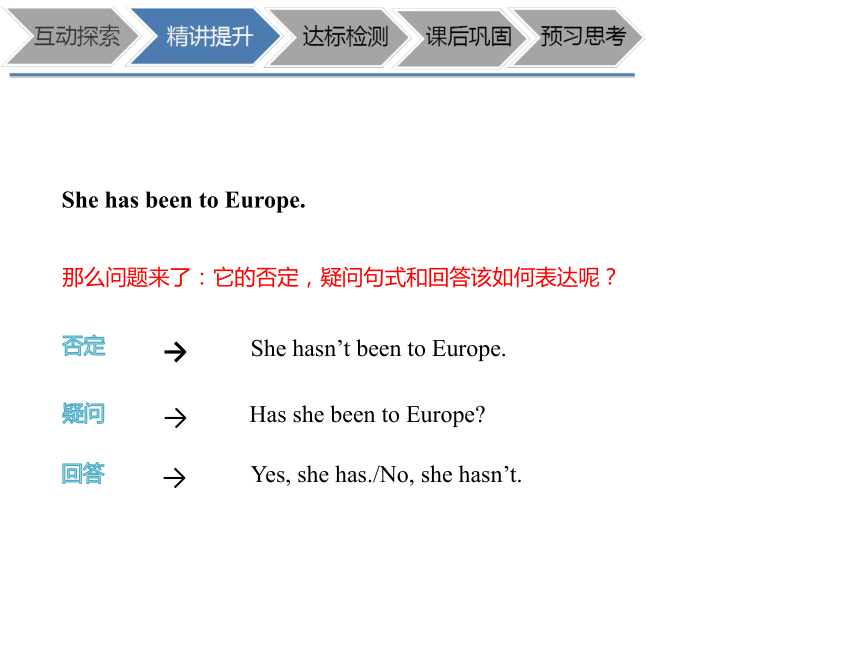


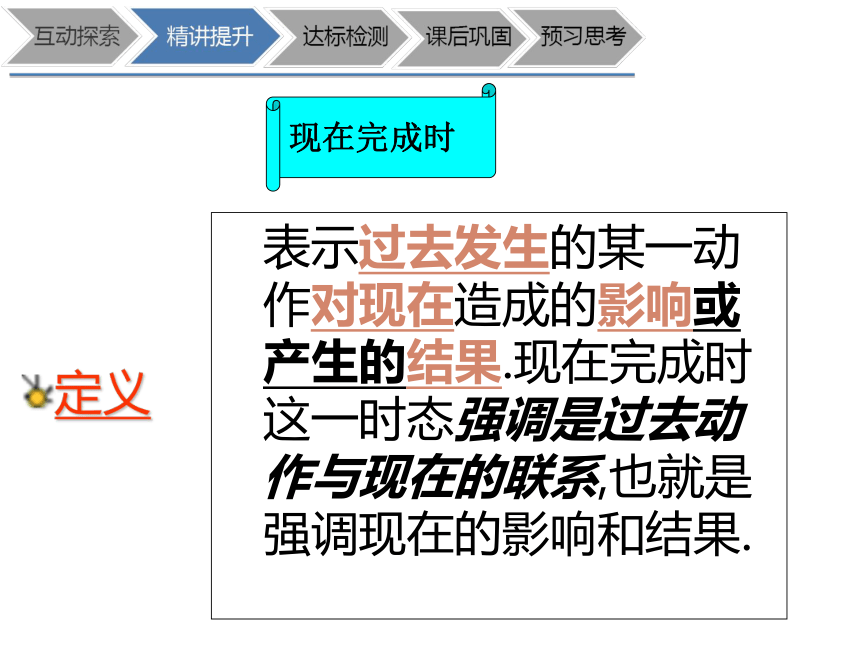
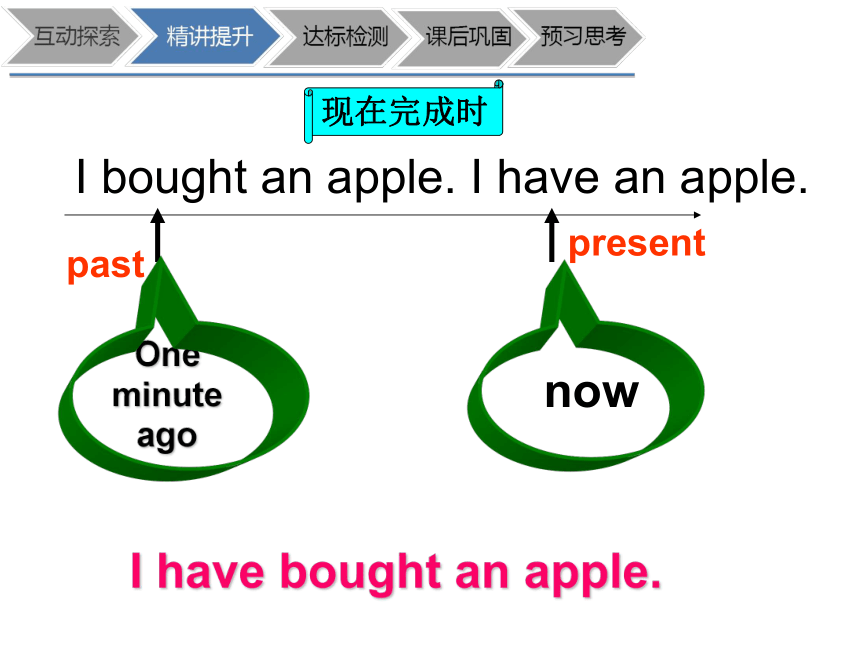
文档简介
课件28张PPT。Mother: John, clean your teeth please.John: Mum, I have already(已经) cleaned them. 现在完成时的构成
have (has)+ 过去分词 现在完成时动词构成
have /has+v 过去分词
助动词否定haven’t
hasn’t疑问Have you……?
Has he……?动词的过去分词形式1.规则动词
2.不规则动词finish--finished--finished
live--lived--lived
carry--carried--carried
stop—stopped--stopped
Eg.go—went—gone
see---saw—seen
forget—forgot--forgotten
She has been to Europe.
那么问题来了:它的否定,疑问句式和回答该如何表达呢?否定疑问回答She hasn’t been to Europe.Has she been to Europe?Yes, she has./No, she hasn’t. → → →A: Have you surfed the internet (上网)?
B: Yes, I have . / No, I haven’t. 什么是现在完成时呢?
定义
表示过去发生的某一动作对现在造成的影响或产生的结果.现在完成时这一时态强调是过去动作与现在的联系,也就是强调现在的影响和结果.
现在完成时presentpastI have bought an apple.One minute agonowI bought an apple.I have an apple.现在完成时现在完成时
过去发生的动作对现在造成的影响或结果。动词构成:have/has+v过去分词have breakfastI have just had my breakfast.(现在我不饿)I’m not hungry now标志性副词过去分词 用法一:
1)现在完成时表示过去发生的动作,并对现在有影响。
Someone has broken the window.
I have already lost the key.
I haven’t read that book yet .
I have just cleaned my hands. 常与already(已经), yet(已经), just(刚刚),ever(曾经) never(从不)等词连用. already: 常用于肯定句中.
yet: 常用于否定句,疑问句尾.
(窗户现在是坏的)
(我现在没有钥匙)(不了解书的内容)(手是干净的)
What has just happened to him ? He has just lost his job. What has just happened to her ?She has just got a love letter . talk on the phone for an hour play soccereat (eaten) French Friessee (seen) a tiger 例题精讲1.My father came back from the bookshop just now.
My father ______ just ________ ______ the book shop.
2.He began to do his homework this afternoon.
He _____ already_______ to do his homework this afternoon.
3.I didn't know that book.
I ______ _________that book yet.
4.They never met him .
They ______ never ______him.
________they ever ______him?
No,______ __________
hasreturnedfromhasbegunhaven'tknownhavemetHavemettheyhaven't现在完成时用法二:
现在完成时表示从过去一直持续到现在的动作或状态。
She has learned English for 5 years.
He has lived in Beijing since ( 自从)he was born .
Have you stayed here since ( 自从) 3 o’clock?
常与for, since引导的时间短语或从句连用.for+ 时间段
since+时间点 , since+ 句子Sam got sick two days ago . Sam has been sick
for two days. Sherry got her driver’s license (执照) in 1999. Sherry has had her driver’s license since(自从) 1999. Arnold started to play tennis in Jan. Arnold has played tennis since Jan. Maggie moved to Hawaii in 1996. Maggie has lived in Hawaii for about 8 years. 实义动词分为:
1) 瞬间动词
2)延续动词 瞬间动词注意: 瞬间动词不能和时间段连用. method 1: 动作状态die be over leaveborrow/buy arrive begin end/finish join marrykeep/had be away be here be on(上演) be married be in be dead他的爷爷已经去世2年了。
Nick 参军3年了.
他离开深圳好长时间了。
这本书我已借了4个月了. His grandpa has been dead for 2 years. Nick has been in the army for 3 years. He has been away from Shenzhen for a long time. I have had/kept the book for 4 months. 例题精讲method 2: It is + 时间段 since +一般过去时的句子.他的爷爷已经去世2年了。
Nick 参军3年了.
他离开深圳好长时间了。
这本书我已借了4个月了. It is 2 years since his grandpa died. It is 3 years since Nick joined the army. It is a long time since he left Shenzhen. It is 4 months since I borrowed the book . 姐姐,你去过北京吗?1 A: Where is your father? Steve?
B: Oh, he has gone to Shanghai for a meeting.The person is not here.2 A: Where have you been these days, Tom?
B: I have been to Tibet.
A: Oh, really? Was it great fun?
B: Yes, very exciting.The person has come back and he is here. I have never been to London before.She has been to China many times. have been to sp. : 曾经去过某地,已经回来.
has gone to sp. : 某人去了某地,还没有回来.用have/has been to, have/has gone to填空:
1.—Where is your brother?
—He ____________ the shop. He’ll be back soon.
2. — ______ you ever _________ to America?
—Yes, I ___________ New York twice.
3. —Here you are at last! Where _____ you _____?
—I _____________ London.
4. —David _______________ Australia.
—I’m sure he’s already arrived.
5. —Is Benny here?
—No, he __________ the school library. He left
five minutes ago.has gone toHave been tohave been tohave beenhave been tohas gone tohas gone to例题精讲我的总结:
1、现在完成时的构成:
肯定式:主语+助动词have /has +过去分词+其它
否定式:主语+助动词have /has+not+过去分词+其它
一般疑问式:助动词Have /Has +主语+过去分词+其它
2、现在完成时的用法
基本用法:表示过去发生或已经完成的某一动作对现在造成的影响或结果。此时,常与时间副词already(已经),yet(还、已经),ever(曾经),never(从不)等连用。
1)现在完成时所表示的动作在说话之前已完成,而对现在有影响。
2)现在完成时所表示的动作开始于过去,持续到现在,也许还会持续下去。常用for和since表示一段时 间的状语或so far,now,today,this week (month,year)等表示包括现在时间在内的状语。
注意:have gone to和have been to的区别1. 复习精讲提升部分的内容;
2. 请在规定时间内完成讲义中的课后巩固部分。
同学们,回家后将以下每一张图都用一句话表达出来。下节课抽同学来朗读一下自己所写的句子,表现积极且没有错误的同学会获得积分奖励及老师的赞美哦。
参考句式:Where is the ball?
---It’s...
have (has)+ 过去分词 现在完成时动词构成
have /has+v 过去分词
助动词否定haven’t
hasn’t疑问Have you……?
Has he……?动词的过去分词形式1.规则动词
2.不规则动词finish--finished--finished
live--lived--lived
carry--carried--carried
stop—stopped--stopped
Eg.go—went—gone
see---saw—seen
forget—forgot--forgotten
She has been to Europe.
那么问题来了:它的否定,疑问句式和回答该如何表达呢?否定疑问回答She hasn’t been to Europe.Has she been to Europe?Yes, she has./No, she hasn’t. → → →A: Have you surfed the internet (上网)?
B: Yes, I have . / No, I haven’t. 什么是现在完成时呢?
定义
表示过去发生的某一动作对现在造成的影响或产生的结果.现在完成时这一时态强调是过去动作与现在的联系,也就是强调现在的影响和结果.
现在完成时presentpastI have bought an apple.One minute agonowI bought an apple.I have an apple.现在完成时现在完成时
过去发生的动作对现在造成的影响或结果。动词构成:have/has+v过去分词have breakfastI have just had my breakfast.(现在我不饿)I’m not hungry now标志性副词过去分词 用法一:
1)现在完成时表示过去发生的动作,并对现在有影响。
Someone has broken the window.
I have already lost the key.
I haven’t read that book yet .
I have just cleaned my hands. 常与already(已经), yet(已经), just(刚刚),ever(曾经) never(从不)等词连用. already: 常用于肯定句中.
yet: 常用于否定句,疑问句尾.
(窗户现在是坏的)
(我现在没有钥匙)(不了解书的内容)(手是干净的)
What has just happened to him ? He has just lost his job. What has just happened to her ?She has just got a love letter . talk on the phone for an hour play soccereat (eaten) French Friessee (seen) a tiger 例题精讲1.My father came back from the bookshop just now.
My father ______ just ________ ______ the book shop.
2.He began to do his homework this afternoon.
He _____ already_______ to do his homework this afternoon.
3.I didn't know that book.
I ______ _________that book yet.
4.They never met him .
They ______ never ______him.
________they ever ______him?
No,______ __________
hasreturnedfromhasbegunhaven'tknownhavemetHavemettheyhaven't现在完成时用法二:
现在完成时表示从过去一直持续到现在的动作或状态。
She has learned English for 5 years.
He has lived in Beijing since ( 自从)he was born .
Have you stayed here since ( 自从) 3 o’clock?
常与for, since引导的时间短语或从句连用.for+ 时间段
since+时间点 , since+ 句子Sam got sick two days ago . Sam has been sick
for two days. Sherry got her driver’s license (执照) in 1999. Sherry has had her driver’s license since(自从) 1999. Arnold started to play tennis in Jan. Arnold has played tennis since Jan. Maggie moved to Hawaii in 1996. Maggie has lived in Hawaii for about 8 years. 实义动词分为:
1) 瞬间动词
2)延续动词 瞬间动词注意: 瞬间动词不能和时间段连用. method 1: 动作状态die be over leaveborrow/buy arrive begin end/finish join marrykeep/had be away be here be on(上演) be married be in be dead他的爷爷已经去世2年了。
Nick 参军3年了.
他离开深圳好长时间了。
这本书我已借了4个月了. His grandpa has been dead for 2 years. Nick has been in the army for 3 years. He has been away from Shenzhen for a long time. I have had/kept the book for 4 months. 例题精讲method 2: It is + 时间段 since +一般过去时的句子.他的爷爷已经去世2年了。
Nick 参军3年了.
他离开深圳好长时间了。
这本书我已借了4个月了. It is 2 years since his grandpa died. It is 3 years since Nick joined the army. It is a long time since he left Shenzhen. It is 4 months since I borrowed the book . 姐姐,你去过北京吗?1 A: Where is your father? Steve?
B: Oh, he has gone to Shanghai for a meeting.The person is not here.2 A: Where have you been these days, Tom?
B: I have been to Tibet.
A: Oh, really? Was it great fun?
B: Yes, very exciting.The person has come back and he is here. I have never been to London before.She has been to China many times. have been to sp. : 曾经去过某地,已经回来.
has gone to sp. : 某人去了某地,还没有回来.用have/has been to, have/has gone to填空:
1.—Where is your brother?
—He ____________ the shop. He’ll be back soon.
2. — ______ you ever _________ to America?
—Yes, I ___________ New York twice.
3. —Here you are at last! Where _____ you _____?
—I _____________ London.
4. —David _______________ Australia.
—I’m sure he’s already arrived.
5. —Is Benny here?
—No, he __________ the school library. He left
five minutes ago.has gone toHave been tohave been tohave beenhave been tohas gone tohas gone to例题精讲我的总结:
1、现在完成时的构成:
肯定式:主语+助动词have /has +过去分词+其它
否定式:主语+助动词have /has+not+过去分词+其它
一般疑问式:助动词Have /Has +主语+过去分词+其它
2、现在完成时的用法
基本用法:表示过去发生或已经完成的某一动作对现在造成的影响或结果。此时,常与时间副词already(已经),yet(还、已经),ever(曾经),never(从不)等连用。
1)现在完成时所表示的动作在说话之前已完成,而对现在有影响。
2)现在完成时所表示的动作开始于过去,持续到现在,也许还会持续下去。常用for和since表示一段时 间的状语或so far,now,today,this week (month,year)等表示包括现在时间在内的状语。
注意:have gone to和have been to的区别1. 复习精讲提升部分的内容;
2. 请在规定时间内完成讲义中的课后巩固部分。
同学们,回家后将以下每一张图都用一句话表达出来。下节课抽同学来朗读一下自己所写的句子,表现积极且没有错误的同学会获得积分奖励及老师的赞美哦。
参考句式:Where is the ball?
---It’s...
同课章节目录
- Module 1 Family and friends
- Unit 1 Family and relatives
- Unit 2 I have a good friend
- Unit 3 Spending a day out togethe
- Module 2 Places and activities
- Unit 4 What would you like to be?
- Unit 5 Open Day
- Unit 6 Going to school
- Unit 7 Rules round us
- Module 3 Food and drink
- Unit 8 The food we eat
- Unit 9 Picnics are fun
- Unit 10 Healthy eating
- Unit 11 Let's make a pizza
